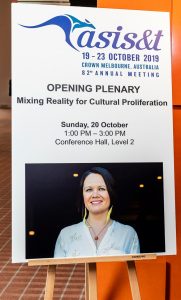The Annual Meeting of Association for Information Science and Technology (ASIS&T) was organized in Melbourne, Australia at 19th to 23rd October 2019.
The theme of the conference was INFORMATION… ANYONE, ANYWHERE, ANY TIME, ANY WAY
ASIST could be considered as one of the main conferences of Library and Information Science (LIS) field. This year conference was already 82nd meeting of this research community. This was the second time ever outside of North America and first time it was organized in Australia!
The keynote speakers
In her opening keynote ‘Mixing reality for cultural proliferation’ Mikaela Jade discussed her journey as an Indegenous woman building a technology company Indigital. The company works to develop new ways to digitise and translate knowledge and culture from remote communities.

Opening keynote photo from ASIST 2019 pages
Helena Teede, an Endocrinologist, the Executive Director of Monash Partners Academic Health Sciences Centre and Director of the Monash Centre for Health Research and Implementation, School of Public Health, Monash University gave the closing keynote ‘Changing the Paradigm: Driving Disruption Through Collaboration to Create a Learning Health System’.
She talked about the lack of strategic planning of research, silos & lack of systems approaches. The ideas of data-driven healthcare improvement were strongly present in her statements and she also called for metrics to guide action in healthcare.
General notions and an example of a panel
Regarding to education in LIS field, data science seemed to be a hot topic, especially in the USA. Several sessions related to this discussion. Past was pondered, e.g., in a panel named Does Information Science Need History and Foundations? Furthermore, also the future of the field raised in the discussions. ASIST has always presentations and panels from a wide spectrum of topics and this year was not an exception. Everything between Breaking Social Media Bubbles for Information Globalization to Research Data Sharing Across National Borders. The Final Program Booklet can be found from here.
As an example of the several interesting panel discussions available in the conference we highlight here one.
Kristina attended a panel discussion about digital equity for marginalized and displaced people. The panellists were Gregory Rolan and Sue McKemmish, both from Monash University, Australia, Kathy Carbone from UCLA, USA, and Barbara Reed from Recordkeeping Innovation in Australia. The theme included for example refugees, stateless people or otherwise geographically displaced people but also children taken into custody. Digital equity was seen as equity for all in new and emerging digital information systems, also those who do not participate within the digital sphere. Documentation overall was seen as central, both the right to having ones information kept in records, and to know where possible records exist, what they contain and why they have been created. These records can be of different kinds, including digital health records. In addition to more formal records, also, for example, children in care could have apps where they can keep their own records.
HIBA project
The members of HIBA were well presented in the panel discussion “Information Behaviour and Practices Research Informing Technology and Service Design”.

The panel discussion, lead by Noora Hirvonen, included short presentations from Isto Huvila (via a video), Ying-Shang Liu, Kristina Eriksson-Backa and Heidi Enwald.
Isto discussed archaeology-related information work and practices in relation to development of documentation and information management technologies and services. Heidi talked about her research about health promotion e-health services design and HIL from the projects MOPO, GASEL and PrevMetSyn.
Ying-Hsang Liu from Australian National University in Canberra presented his work with engineers in the aerospace industry, for whom he is a consultant. According to him, industry understands challenges but may not have solutions and hence IBP models and theories are important. Engineers are also interested in metrics and hence we need to communicate with them about metrics, what results can be expected. In industry, time is valuable; results might be needed within a certain time limit. There is also a challenge with working with industry projects in that they are concerned about intellectual property and thus results might have to be kept secret.
Kristina presented the HIBA project and three of the studies conducted within it: the online survey study on diabetes risk test users by Hai Nguyen, the focus group study of older adults’ views on MyKanta and the recently conducted national survey of 1500 Finns aged 55-70 years, and their health information behaviour and views of e-health services. Some implications concerning the format and contents of e-health services based on the results were presented.
Huvila I, Enwald H, Eriksson-Backa K, Liu Y-H & Hirvonen N (2019) Information behaviour and practises research informing technology and service design. Proceedings of the Association for Information Science and Technology , 56(1), 541-545. ASIS&T 2019, Melbourne, Australia, 19-23 October 2019. (Panels and alternative events) https://asistdl.onlinelibrary.wiley.com/doi/full/10.1002/pra2.86?af=R

We also had time to go and meet some penguins!
About ASIST: https://www.asist.org/
